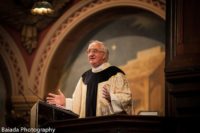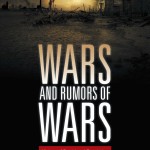I cannot imagine being a member of a church that did not struggle with the abominable Paris murders. Last Sunday my Rector, Canon Anne Marie Richards, preached to the events; this week it was my turn.
In all the thought about, preparation for, this sermon I think I was challenged to realize that the two halves of the Book of Daniel were becoming nearer to each other. The first half dealing with “real-time” living; the second half dealing with apocalyptic living some time “in the future.” I am surprised but I fear we are drawing nearer to living in apocalyptic times when “conflict in heavenly places” is enacted on earth. God help us.
Below is the audio for the sermon (“Lots of Reigning”) and also the text (as always, the two do not exactly match!).
Sermon preached at Trinity Church; Sunday November 22nd 2015
The Reverend Alan Neale; “Lots of Reigning”
Today is “Christ the King” Sunday; today I relish the experience of seeing/hearing those committed to the concept of a republic… praising the concept of kings and kingdoms and with gay abandon throwing crowns into the air in approval not disgust. All goes to show… 27 years ago the man was taken out of monarchy, but some residual monarchism still abides in the man! Ah, sweet irony; God invented it!
Today’s passage from Daniel 7 uses imagery and metaphor of monarchy to express both the dire fears but also the profound hopes of the book’s writers and readers alike; it is in Daniel that we will spend a little time this morning.
The engrossing, perplexing, kaleidoscopic book of Daniel is in two halves. Chapters 1-6) recount the stories of Daniel and friends living in an environment hostile to cultic practices and core beliefs; the second half (chapters 7-12) speak in apocalyptic, catacyclismic, cosmic language of a primal, mythic conflict between good and evil, right and wrong, angels and demons. Friends, it seems to me, as world events unfurl, that the gap between these two halves is being reduced, minimized to an awful and terrible degree.
On the cusp of an abyss the writers of Daniel present to us the King who, indifferent to race and religion and nationality (7:14), is committed to defragmenting a fragmented world; integrating a disintegrated universe; making functional a dysfunctional global existence.
And the King that Daniel envisions is one Experienced, Fiery, Competent and Discerning.
The Experienced King. Daniel 7:9 (Message) “Thrones were set in place and The Old One sat down; robes white as snow, hair white like wool.” Having worked with recently ordained priests as colleagues, I always sensed a little angst when I began a sentence thus: “After thirty years of parish ministry, …” but experience is of value; it cannot be gained expeditiously nor bought by any payment other than years. It is of vital, urgent importance that the God I worship (the God of Abraham, Ishmael and Jesus) is one not discomforted by events nor unbalanced by calamity. In my mind I am clear that to foreknow is not to fore-ordain, but to foreknow means that our God is never taken by surprise. Our Father God, our Lord Jesus are divine masters at the work of preparation; often unnamed but always present. It is therefore that we find refuge in the Rock, a strong tower in the Name of the Lord.
The Fiery King. Daniel 7:9-10 “His throne was flaming with fire, its wheels blazing. A river of fire poured out of the throne.” Reflecting on his pivotal role in WWII, Sir Winston Churchill said, “The nation had the heart of the lion, I had the luck to give the roar.” Our God has indeed the fiery heart of the lion and we his people (preachers and laity alike) are called to “give the roar” – in season and out of season. Our God is not indifferent to, untouched by the “terrors that fly by night.”
The cries that make throats sore, the wounds that make hearts bleed, the fears that make minds closed – all this and more, far more, touches the very heart of God and inflames a fire to assuage the pain as well as to attack the evil.
The Competent King. Daniel 7:10 “Thousands upon thousands served him, tens of thousands attended him.” Friends, remember that for the writer of Daniel figures of “tens of thousands” denoted an innumerable, countless host. Too often the church has countenanced lack of competency in the name of pastoral care, too often the Christian community has misjudged inadequacy as sign of humility; this is not the path of the divine. All of us are gifted and from all of us is expected the best we can offer; thus it is with our competent and capable King. At times of uncertainty, stress, palpable weakness we entrust, surrender ourselves to Him for “He is able, adept, adroit, accomplished to keep us from stumbling” (Jude 1:24).
The Discerning King. Daniel 7:10 “The court was seated and the books were seated; the court began its session and sat in judgment.” One of the challenges of the abominations of the Paris murders is that we all have been tempted to react rather than respond. For some most immediately and tragically devastated this is understandable; but for those of us who watch in armchairs and view in comfort, we honor the bereaved and suffering by responding with discernment. I realize that much anguish in my life has been caused by knee-jerk reaction rather than by considered response. Our God in judgment is the One who calls “the court to order, the books to be opened” and then judgment to be made.
I hope you noticed that our lectionary compilers yet again have acted as our Scriptural baby-sitters and by omitting verses 11-12 have done their best (or worst) to protect us from “monsters and beasts” of evil and punishment by fire and eventual extirpation. I believe this grievous omission not only steals from us the cosmic reality of sin but also the commitment to punishment and retribution.
When Jesus describes His kingdom as “not of this world”, he speaks not of an “other-worldly” kingdom but rather a kingdom instituted and established upon divine not human principles, a kingdom dealing with eternal verities rather than short-term accommodations.
To misquote George Orwell, “all are evil but some are more evil than others”. Evil is not the definition of any one religion, any one nation but there are evil people who do evil things and, I believe, such people are sometimes moved by a principle of evil far beyond their ken nor intent. It is salutary to remember words of St. Paul, “Our struggle is not against enemies of blood and flesh, but against the rulers, authorities, cosmic powers of this present darkness, against the spiritual forces of evil in the heavenly places” Ephesians 6:10.
In all things Daniel urges us to watch – to expect to see at work more clearly the God of Experience, Fire, Competency and Discernment and to pray for such in the leaders of the nations of the world. AMEN


